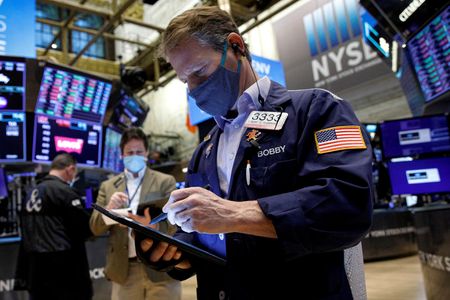 1
1 1
1

By Herbert Lash
NEW YORK (Reuters) -U.S. and European stocks slid while the dollar strengthened on Friday after hot U.S. consumer price data for May raised the likelihood that the Federal Reserve will prolong an aggressive campaign of hiking interest rates to tame inflation.
The consumer price index accelerated 1.0% last month after gaining 0.3% in April, the Labor Department said. Economists polled by Reuters had forecast monthly CPI picking up 0.7%.
Some economists and market participants had expected the data to show inflation had peaked in May, but the report indicated otherwise as gasoline prices hit a record high and the cost of food soared.
“It was pretty hot. This report suggests that underlying inflation pressures remain quite strong,” said Aichi Amemiya, senior U.S. economist at Nomura.
The dollar rose to a near four-week high against a basket of currencies while U.S. Treasury prices tumbled and intermediate-dated yields rose to their highest levels in more than a decade.
Stocks on Wall Street and in Europe fell more than 2% as investors feared central bank efforts to control inflation will be so harsh it will slow growth and squeeze corporate earnings.
The pan-European STOXX 600 index slid 2.69% and MSCI’s gauge of global equity markets shed 2.42%.
On Wall Street, the Dow Jones Industrial Average fell 2.06%, the S&P 500 lost 2.37% and the Nasdaq Composite dropped 3.01%.
The stronger-than-expected CPI data has changed the calculus for what the Fed does in September after “most-assuredly” raising rates 50 basis points next week and in July, said Art Hogan, chief market strategist at National Securities.
“The wagering on September had been 50-50 between a 25 basis points to a 50 basis points hike, and now this has definitely shifted to 50 basis points,” Hogan said.
Investors expect the Fed to raise rates by 50 basis points next week and in July, but Nomura’s Amemiya didn’t see the possibility of a 75 basis point hike next week.
Concerns also mounted about demand and growth in China, the world’s second-largest economy, after Shanghai and Beijing went back on fresh COVID-19 alerts on Thursday and imposed new lockdown restrictions.
The yen rose off of 20-year lows after Japanese policymakers made rare comments about its weakness. Japan’s government and central bank said they were concerned by recent sharp falls in the yen in a rare joint statement, the strongest warning to date that Tokyo could intervene to support the currency.
The yen has been ploughing 20-year lows against the dollar and seven-year troughs against the euro on expectations the BOJ will continue to lag other major central banks in exiting its stimulus policy.
The Japanese currency strengthened 0.15% to 134.15 per dollar, while the euro weakened 1.03% against the yen.
The dollar index rose 0.784%, with the euro down 0.88% to $1.0521.
Overnight in Asia, MSCI’s broadest index of Asia-Pacific shares outside Japan fell 0.9%.
Continued strong buying by foreign investors and cautious hopes of regulatory easing on tech firms lifted China stocks, despite lockdown alerts.
China’s blue-chip CSI300 index was up 1.5%, while Hong Kong shares trimmed earlier losses to end off 0.2%.
Despite slipping on China’s new COVID-19 alerts and the U.S. inflation data, crude oil prices remained on track for another weekly gain due to solid demand for fuels in the United States.
U.S. crude was down 1.08% to $120.20 per barrel and Brent was at $121.58, down 1.21% on the day.
Spot gold added 0.4% to $1,854.60 an ounce.
(Reporting by Herbert Lash; Editing by Chizu Nomiyama, Kirsten Donovan)